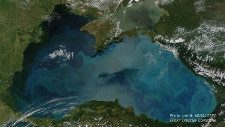Assassination in Ankara: Russia, NATO, and Turkey’s Violent Politics
Halil M. Karaveli
On December 19, Mevlut Mert Altintas, a Turkish police officer, assassinated Andrei Karlov, Russia’s ambassador to Turkey. His action was apparently meant as retribution for Russian bombings in eastern Aleppo, and he is the latest in a string of right-wing terrorists in Turkey whose acts have served to draw Ankara back toward the West. Less than two weeks after the assassination, in the early hours of January 1, a gunman believed to have been affiliated with the Islamic State (ISIS) killed at least 39 people at an Istanbul nightclub. If such attacks continue, as they very likely will, they could undermine Erdogan’s grip on power, which is what the wave of terror is all about, even if the perpetrators differ.
Related Publications
-
ISDP Annual Report 2023
ISDP’s Annual Report for the year 2023. We look back on 2023, a year in which tensions and conflicts captured the strategic space in ISDP’s focus areas, making headlines around […]
-
A New Spring for Caspian Transit and Trade
Major recent shifts, starting with the Taliban victory in Afghanistan and Russia’s war in Ukraine have led to a resurgence of the Trans-Caspian transportation corridor. This corridor, envisioned in the […]
-
Turkey’s Opposition Can’t Win Without the Working Class
Kemal Kilicdaroglu, the leader of Turkey’s main opposition Republican People’s Party (CHP), has a realistic chance of defeating President Recep Tayyip Erdogan in the upcoming presidential election on May 14. […]
-
Promise And Peril In The Caucasus
America’s national security bureaucracy separates the Caucasus and the Middle East into different bureaus, with Central Asia in yet another office. This is part of the reason the U.S. has […]



